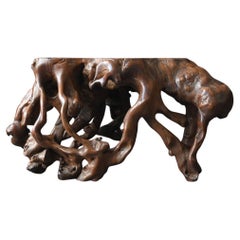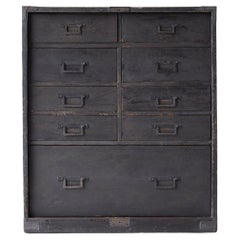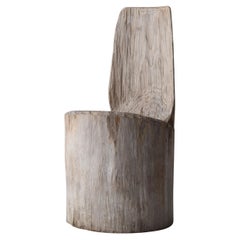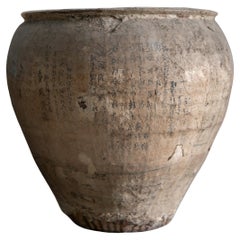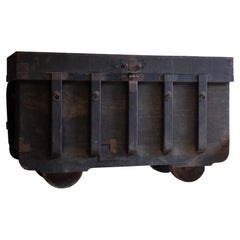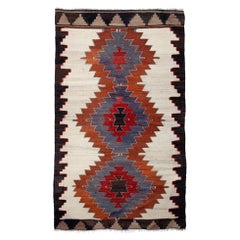Japan - Furniture
to
549
508,967
446,321
1,988
1,325
26
187
137
109
11
8
4
3
3
2
2
1
1
139
384
1,465
1,351
458
517
271
7
8
13
22
26
107
112
84
76
23
1,118
831
785
764
763
2,745
1,929
1,891
707
706
3,339
3,246
3,280
289
58
41
34
33
Item Ships From: Japan
Wooden low table made from the roots of an old Japanese tree / Sofa table
Located in Sammu-shi, Chiba
This is an old wooden low table made in Japan. It is a one-of-a-kind piece crafted by carving out the root of a hardwood tree—likely zelkova—and preserving as much of its natural for...
Category
20th Century Japanese Taisho Japan - Furniture
Materials
Wood
Japanese Antique 9-Drawer Storage Chest 1860s-1920s / Tansu Sideboard Wabisabi
Located in Chōsei District Nagara, JP
This is an old 9 drawer storage made in Japan.
It was made between the Meiji and Taisho periods (1860s-1920s).
The material used is cedar wood, and the texture of the wood surface ov...
Category
Early 20th Century Japanese Taisho Japan - Furniture
Materials
Iron
Japanese Old Primitive Side Chair 1950s-1970s / Wabi Sabi
Located in Chōsei District Nagara, JP
This is an old side chair made in Japan.
It was made in the postwar period (1950s-1970s), and the material used is cedar wood with a rustic look.
The structure, carved in one piece ...
Category
Late 20th Century Japanese Primitive Japan - Furniture
Materials
Cedar
19th Japanese antique Cha Tsubo, paper covered pottery vase, wabi sabi tea jar
Located in 常陸大宮市, JP
From Tohoku area, Japan.
This Tsubo, pottery Jar is a product of late Edo to Meiji era (estimate 1860s-1910) estimate from the style & condition.
The surface is reinforced & coated...
Category
Late 19th Century Japanese Edo Antique Japan - Furniture
Materials
Ceramic, Porcelain, Paper
1850s-1870s Edo Japanese antique Wheeled Trunk Kuruma Nagamochi, Kuruma Tansu
Located in 常陸大宮市, JP
New finds from Kominka (old traditional style house) in Ibaraki pref., Japan.
There're several type of wheeled Tansu - "Kuruma Dansu" in Japanese - and...
Category
Late 19th Century Edo Antique Japan - Furniture
Materials
Wood, Cedar
Semi Old Vintage Handwoven Wool Mut Kilim Central Anatolian Rug Turkish Carpet
Located in Tokyo, JP
This is a South Anatolian Vintage / Semi-old Handwoven Kilim from the town of Mut in Mersin Province, located in the Mediterranean region of Anatolia, Turkey. These kilims are renown...
Category
Late 20th Century Turkish Kilim Japan - Furniture
Materials
Wool, Cotton, Natural Fiber
$456 Sale Price
20% Off
Japanese Vintage Side Table in Zelkova, Mid Showa Period '1940-'
Located in Hitachiomiya-shi, 08
This vintage side table was crafted in the Mid Showa Period '1940-'
Made from Japanese Zelkova, known for its durability and beauty, the tabletop features a stunning "tama-moku" woo...
Category
Mid-20th Century Japanese Showa Japan - Furniture
Materials
Wood
1870s-1900s Japanese antique large Mizuya tansu chest. wabi sabi primitive
Located in 常陸大宮市, JP
New finds from Kanto or Tohoku area, Japan.
This large Mizuya tansu is made from premium quality, reddish Sugi Cedar, the product of circa 1870s to 1900s (Meiji to early Taisho peri...
Category
Late 19th Century Japanese Meiji Antique Japan - Furniture
Materials
Wood, Cedar
Rattan Lounge Chair by Isamu Kenmochi, circa 1960s
By Isamu Kenmochi, Yamakawa Rattan
Located in Sammu-shi, Chiba
Rattan sofa designed by Isamu Kenmochi and manufactured by Yamakawa Rattan. Circa 1960s.
No restorations or modifications have been made.
The rattan on this chair is broken in only ...
Category
1960s Japanese Showa Vintage Japan - Furniture
Materials
Rattan
Japanese Antique Folding Low Table "Chabudai" in Oak, Circa 1926
Located in Hitachiomiya-shi, 08
This antique low table was crafted in the Early Showa Period '1926-'.
In Japan, where people traditionally sit on the floor, tables are designed to be lower in height compared to We...
Category
Early 20th Century Japanese Showa Japan - Furniture
Materials
Oak
Antique wooden apple-shaped figurine/Fruit object/Late 20th century
Located in Sammu-shi, Chiba
This is a unique wooden sculpture carved from a natural burl, making full use of the organic form of the wood. The artist is unknown, but as it was sourced within Japan, we have desc...
Category
Late 20th Century Japanese Other Japan - Furniture
Materials
Wood
Japanese Antique Small Drawer 1860s-1900s / Tansu Nightstand Wabi Sabi
Located in Chōsei District Nagara, JP
This is an old small drawer storage made in Japan.
The furniture was made in the Meiji period (1860s-1900s). The material is cedar wood and the handles are made of iron.
The design i...
Category
Early 20th Century Japanese Meiji Japan - Furniture
Materials
Iron
Japanese Antique Large Black Tansu 1860s-1900s / Cabinet Sideboard Wabi Sabi
Located in Chōsei District Nagara, JP
This is an old large Tansu made in Japan.
This furniture was made during the Meiji period (1860s-1900s).
The material used is cedar wood. The iron metal fittings in the center add an...
Category
Early 20th Century Japanese Meiji Japan - Furniture
Materials
Iron
Japanese Antique Drawer Storage 1860s-1920s / Tansu Sideboard Wabisabi
Located in Chōsei District Nagara, JP
This is an old drawer storage made in Japan.
It is a historic piece of furniture made during the Meiji and Taisho periods (1860s-1920s).
The material is cedar wood. The handles are m...
Category
Early 20th Century Japanese Meiji Japan - Furniture
Materials
Iron
Japanese Antique Drawer Storage 1900s-1920s / Tansu Sideboard Wabi Sabi
Located in Chōsei District Nagara, JP
This is a drawer storage made in Japan.
It was made in the Taisho period (1900s-1920s) and is made of quaint cedar wood. The handles are made of iron, preserving the flavor of the pe...
Category
1910s Japanese Taisho Vintage Japan - Furniture
Materials
Iron
Japanese Antique Black Tansu 1920s-1940s / Cabinet Sideboard Wabisabi
Located in Chōsei District Nagara, JP
This is a black tansu made in Japan.
It was made in the early Showa period (1920s-1940s) and still retains its beauty and practicality through the ages.
The material used is cedar wo...
Category
Mid-20th Century Japanese Showa Japan - Furniture
Materials
Cedar
Japanese antique long wooden low table/1868-1920/simple design sofa table
Located in Sammu-shi, Chiba
This is a wooden workbench from the first half of the 20th century in Japan, a piece with its stately construction and long history. Katsura and horse chestnut wood are used for the ...
Category
Late 19th Century Japanese Showa Antique Japan - Furniture
Materials
Wood
Japanese antique wooden storage shelf/ Early 20th century/Wooden cabinet
Located in Sammu-shi, Chiba
This is a vertical wooden storage cabinet made of Japanese cedar in the first half of the 20th century. Although it is unknown where it was used, its appearance oozes a beauty that transcends practical use. The rustic feel of the material and its quiet presence give it a nostalgic warmth not found in modern furniture.
This piece is made entirely of solid Japanese cedar, and the simple and disciplined structure of the vertical cleats, especially on the doors, and the cedar planks passed horizontally and overlapping from the reverse side, bring a perfect balance and rhythm to the overall look of the piece. This kind of design reveals a uniquely Japanese sense of design.
The deep candy-colored texture created by the aging process is a taste that only antique pieces can have. The subtle changes in color from suntanning and areas touched by the hand tell a quiet story of the passage of time. The doors are simple and close with small wooden stoppers, preserving the practicality and warmth of the past.
The shelves are securely fastened and provide ample storage capacity. Books, clothes, daily necessities, and various other items can be beautifully organized. The backs and shelves are stained and worn from use, and there are also some holes repaired on the sides and small chips.
In a modern living space, this shelf can be used as a shelf in a study, as an accent in a living room, or as a quiet corner of a room where one spends quiet time alone, bringing a sense of calmness and flavor to the entire space. These long, locker-like proportions of antique shelves...
Category
Early 20th Century Japanese Taisho Japan - Furniture
Materials
Cedar
Japanese Antique Large Stacking Tansu 1860s-1920s / Cabinet Wabisabi
Located in Chōsei District Nagara, JP
This is a Stacking Tansu made in Japan.
It was made between the Meiji and Taisho periods (1860s-1920s), and is a traditional storage furniture with Japanese craftsmanship.
The materi...
Category
Early 20th Century Japanese Meiji Japan - Furniture
Materials
Iron
Antique iron hanging bell from Japan or East Asia/Early 20th century
Located in Sammu-shi, Chiba
This is an old iron hanging bell believed to have been made over 100 years ago. It is highly likely that it was manufactured in Japan, though the possibility of Korean or Chinese ori...
Category
Early 20th Century Japanese Taisho Japan - Furniture
Materials
Iron
Japanese Antique Large Kuruma Tansu 1800s-1860s / Cabinet Sideboard Wabi Sabi
Located in Chōsei District Nagara, JP
This is an old, large, Japanese-made Kuruma-Tansu.
Made in the Edo period (1800s-1860s), it is a powerful and dignified piece, the culmination of the skills and aesthetic sense of th...
Category
Late 19th Century Japanese Edo Antique Japan - Furniture
Materials
Iron
Hiroyuki Nishimura Sculptural bench 1 Tribal Style
By Hiroyuki Nishimura
Located in Shibuya-ku, Tokyo
Weighing Worlds
Sculptural bench
Material: Zelkova
This work is carved from log with some kinds of chainsaws.
Most of wood used for his works are unable to use anything, these woods...
Category
2010s Japanese Tribal Japan - Furniture
Materials
Wood
$16,000 / item
19th Japanese antique Urushi small Tansu box chest of drawers wabi sabi mingei
Located in 常陸大宮市, JP
from Tohoku area, Japan.
Japanese antique small box tansu chest of drawers, Kohikidashi, made of Sugi Cedar.
Product of circa 1850s-1870s (late Edo to early Meiji era), estimate from...
Category
Late 19th Century Japanese Edo Antique Japan - Furniture
Materials
Wood, Cedar
Japanese Antique Copper Tub 1800s-1860s / Flower Vase Wabi Sabi
Located in Chōsei District Nagara, JP
This is an old copper tub made in Japan.
It was made during the Edo period (1800s-1860s) and used as a tool to draw water from a well.
This tool is one of the tools of daily life tha...
Category
Late 19th Century Japanese Edo Antique Japan - Furniture
Materials
Copper, Iron
Japanese Antique Large Iron Plate Abstract Art 1900s-1940s / Wabi Sabi
Located in Chōsei District Nagara, JP
This is a door that was an iron plate door made in Japan.
It is an old fixture made in the early Showa period (1900s-1940s), with iron plates carefully stretched over a cedar wood fr...
Category
Mid-20th Century Japanese Showa Japan - Furniture
Materials
Iron
Japanese Antique Drawer 1882s / Tansu Sideboard Wabi Sabi
Located in Chōsei District Nagara, JP
This is a drawer storage made in Japan.
It was made in the Meiji (1882s), and the year is left in writing on the back.
Warm cedar wood is used for the material, and heavy iron is use...
Category
1880s Japanese Meiji Antique Japan - Furniture
Materials
Iron
Japanese Antique Drawer with Bookcase 1860s-1920s / Nightstand Wabisabi
Located in Chōsei District Nagara, JP
This is a drawer storage with an attached book stand made in Japan.
It was produced between the Meiji and Taisho periods (1860s-1920s). This antique furniture reflects the Japanese l...
Category
Early 20th Century Japanese Meiji Japan - Furniture
Materials
Iron
Japanese Antique Primitive Armchair 1860s-1920s / Side Chair Wabi Sabi
Located in Chōsei District Nagara, JP
This primitive-style armchair is steeped in Japanese tradition and aesthetics.
It was created in the Meiji and Taisho periods (1860s-1920s) for its powerful yet delicate beauty.
Bold...
Category
Early 20th Century Japanese Primitive Japan - Furniture
Materials
Wood
18th Century Japanese Rinpa Screen. White Chrysanthemums. School of Korin.
Located in Kyoto, JP
School of Ogata Korin
White Chrysanthemums
18th Century, Edo period.
A two-panel Japanese screen. Ink, color, gofun and gold leaf on paper.
Dimensions: H. 171 cm x W. 188 cm (67.5” x 74”)
On this two-panel Japanese screen we see blooming chrysanthemums, a flower which embodies the essence of autumn in Japan. Here the traditional floral theme has been simplified and stylized. The bright colors and asymmetrical composition against the delicate gold leaf create a luxurious and ornate work of art. Its background, a strikingly patinated grid of gold leaf, denies any sense of place or time and imbues everything with an ethereal glow. The leaves and stems of the plants are nothing more than pools of mottled color and ink without any outline whatsoever. These are typical Rinpa adaptations of traditional ink painting methods; tarashikomi, or diluted washes of color blended while very wet, and mokkotsu, or “bonelessness,” which creates forms without exterior outlines. The relief work of the rounded flower petals has been obtained by the moriage process (a mixture based on ground shells modeled on the surface of the paper).
On the lower right of the screen, the siganture “Hokyo Korin Jakumyo” and the “Hoshuku” seal can be read. Korin is Ogata Korin, famed for the Irises (Nezu Museum) and Red and White Plum Blossom (MOA Museum of Art) folding screens, both National Treasures. Korin worked in both Kyoto and Edo in the mid-Edo period. Korin was using the art name “Jakumyo” just after he received the Hokyo level, which was in 1701.
This particular screen was published in May of 1961 in the Japanese Sansai Fine Art Magazine*. An in depth article accompanies the photograph of the screen and and a photograph of the signature and seal. This article devotes much of its body to discussing the moriage technique, how it enlivens the chrysanthemum flowers and Korin’s specific skill in using the technique. The article goes on to discuss the most famous works of Korin, utilizing this technique, which were known at the time. Specifically a two-panel screen held in the Honolulu Museum which was discovered in the store-house of Takahashi Soan. A two-panel screen pair which the Nakano family own. A two-panel screen pair with chrysanthemums in moriage in fan designs owned by the Nomura family. Also a small folding screen featuring chrysanthemums held in the Yamato Bunkakan. The article goes on to say that this particular two-fold screen came from the Nijo family. Korin is known to have had a strong connection with the aristocratic Nijo family. The article explains that Korin received a lot of favors from the Nijo family and that this screen would have been gifted to them.
Since that time the Honolulu screen has been amended to ‘attributed to Ogata Korin’ and I do not know further details of the other 3 screens. Other Chrysanthemum screens...
Category
18th Century Japanese Edo Antique Japan - Furniture
Materials
Gold Leaf
Antique Asian wooden bucket/Early 20th century/Withered flower vase
Located in Sammu-shi, Chiba
This is an old wooden vessel, believed to have been made in Asia—likely in the Southeast Asian region. While its original use remains unclear, several holes are carved into the upper...
Category
Early 20th Century Southeast Asian Other Japan - Furniture
Materials
Wood
Japanese antique wooden Medicine drawer/1868-1920/MINGEI/Meiji-Taisho
Located in Sammu-shi, Chiba
Introducing a cedar wood medicine chest (kusuri-dansu) made in Japan from the Meiji period to the early Showa period.
These chests were originally used by pharmacies and Chinese med...
Category
Late 19th Century Japanese Meiji Antique Japan - Furniture
Materials
Cedar
Japanese Antique 6-Drawer Storage 1860s-1900s / Tansu Wabisabi
Located in Chōsei District Nagara, JP
This is an old six drawer storage made in Japan.
It was made during the Meiji period (1860s-1900s), and it is the result of the craftsman's solid skills and aesthetic sense.
The mate...
Category
Early 20th Century Japanese Meiji Japan - Furniture
Materials
Iron
Semi Old Vintage Handwoven Wool Mut Kilim Central Anatolian Rug Turkish Carpet
Located in Tokyo, JP
This is a South Anatolian Vintage / Semi-old Handwoven Kilim from the town of Mut in Mersin Province, located in the Mediterranean region of Anatolia, Turkey. These kilims are renown...
Category
Late 20th Century Turkish Kilim Japan - Furniture
Materials
Wool, Cotton, Natural Fiber
$376 Sale Price
20% Off
Japanese Antique Small Drawer 1860s-1920s / Tansu Nightstand Wabisabi
Located in Chōsei District Nagara, JP
This is a small drawer storage made in Japan.
It was made between the Meiji and Taisho periods (1860s-1920s) and is made of cedar wood. The handles are made of iron.
The lean, linea...
Category
Early 20th Century Japanese Meiji Japan - Furniture
Materials
Iron
Japanese Antique Iron Plate Door 1860s-1900s / Low Table Sofa Table Wabi Sabi
Located in Chōsei District Nagara, JP
This is an iron plate sliding door made in Japan.
It is a rare door made in the Meiji period (1860s-1900s), and the craftsmanship of the time still lives on today.
The structure is m...
Category
Early 20th Century Japanese Meiji Japan - Furniture
Materials
Iron
Ararat Rugs Mamluk Wagireh Rug with Jerrehian Border Design Egypt Revival Carpet
By Ararat Rugs
Located in Tokyo, JP
The design source of the rug comes from the possession of Endre Unger, which was sold at Sotheby’s in 1992. That rug with the central star was designed in the early 16th-century rug ...
Category
21st Century and Contemporary Turkish Revival Japan - Furniture
Materials
Wool, Natural Fiber, Organic Material
Japanese Antique Small Drawer 1860s-1920s Meiji period / Tansu / Wabisabi /
Located in Sammu-shi, Chiba
This is an antique Japanese small chest of drawers (小引出し) crafted in the Meiji period (late 19th to early 20th century).
The piece features a deep black lacquered surface that has de...
Category
Early 20th Century Japanese Meiji Japan - Furniture
Materials
Iron
Japanese Antique Huge Drawer Storage 1860s-1900s / Tansu Cabinet Wabisabi
Located in Chōsei District Nagara, JP
This is a huge old Japanese-made drawer storage.
The furniture was made during the Meiji period (1860s-1900s) and is made of cedar wood with rustic and practical iron hardware on the...
Category
Early 20th Century Japanese Meiji Japan - Furniture
Materials
Iron
Japanese Antique Wood Carving Large Penis 1800s-1860s / Sculpture Wabi Sabi
Located in Chōsei District Nagara, JP
This is an old carved large wooden penis statue made in Japan.
It was made during the Edo period (1800s-1860s) and is made of cedar.
In the Tōhoku region of Japan, there has long be...
Category
Late 19th Century Japanese Edo Antique Japan - Furniture
Materials
Cedar
Japanese antique Kannon stone statue/Edo period/Buddhist ornament
Located in Sammu-shi, Chiba
This is a stone statue of Kannon Bosatsu (the Bodhisattva of Compassion), believed to have been made in Japan during the mid to late Edo period (late 18th century onward). The materi...
Category
Early 19th Century Japanese Edo Antique Japan - Furniture
Materials
Stone
Vintage & Old Kilim Cushion Cover, Anatolian Yastik Turkish Modern Pillow 4361
Located in Tokyo, JP
We made a cushion cover using the undamaged parts of the precious and high-quality old & antique kilims that cannot be repaired. Like a painting, a part of the scenery is cut out fro...
Category
2010s Turkish Kilim Japan - Furniture
Materials
Natural Fiber, Organic Material
$120 Sale Price
20% Off
Japanese Antique Cabinet with Glass Doors, Taisho Era '1912-1926', Wabi Sabi
Located in Hitachiomiya-shi, 08
This antique cabinet was crafted in the Taisho Era (1912-1926).
It features a glass-fronted design, with a larger-sized cabinet. Made of Katsura wood, the cupboard has a smooth, fi...
Category
Early 20th Century Japanese Taisho Japan - Furniture
Materials
Wood
Japanese Antique, Chest of Drawers, Meiji Era'1868-1912'Wabi Sabi"Tansu"
Located in Hitachiomiya-shi, 08
This antique chest of drawers was crafted in the Meiji Era (1868-1912).
The urushi (Japanese lacquer) finish, with subtle hints of brown beneath the surface, reflects the passage o...
Category
Late 19th Century Japanese Meiji Antique Japan - Furniture
Materials
Cedar
1860s-1910s Meiji Japanese antique wabi sabi Urushi mid Tansu chest of drawers
Located in 常陸大宮市, JP
From Kanto or Tohoku area, Japan.
This mid tall size, Urushi lacquered Tansu chest of drawers is a product of Meiji era (circa 1860s - 1910s) , estimate from the style & conditions....
Category
Late 19th Century Japanese Meiji Antique Japan - Furniture
Materials
Wood
Japanese Antique Small Drawer 1860s-1920s / Nightstand Tansu Wabi Sabi
Located in Chōsei District Nagara, JP
This is a small drawer storage made in Japan.
The furniture was made between the Meiji and Taisho periods (1860s-1920s) and is made of cedar wood.
Iron is used for the handles, and t...
Category
Early 20th Century Japanese Meiji Japan - Furniture
Materials
Iron
Japanese Antique Tenjin Desk, Meiji Era (1868-1912), Wabi Sabi
Located in Hitachiomiya-shi, 08
This antique writing desk was crafted in the Meiji Era (1868–1912).
Made of chestnut wood and finished with Japanese black urushi lacquer, it features a rich, subdued tone and a cal...
Category
Late 19th Century Japanese Meiji Antique Japan - Furniture
Materials
Chestnut
Japanese Antique BK Middle Drawer 1860s-1900s / Tansu Storage Wabisabi
Located in Sammu-shi, Chiba
This is a very old Japanese black drawer storage.
The furniture is from the Meiji period (1860s-1900s).
It is probably from the Tohoku region of Japan.
The material is mainly cedar w...
Category
Early 20th Century Japanese Meiji Japan - Furniture
Materials
Cedar
1910s-20s Japanese antique 2 tier large glass cabinet. wabi sabi organic
Located in 常陸大宮市, JP
from Kanto area, Japan.
This large, 2 tier wooden glass cabinet is a product of 1910s - 20s (Taisho period) estimate from the style, conditions....
Category
Early 20th Century Japanese Taisho Japan - Furniture
Materials
Glass, Wood, Cedar
Japanese Antique Tansu 1860s-1900s / Cabinet Sideboard Wabisabi
Located in Chōsei District Nagara, JP
This is a medium sized Tansu made in Japan.
Made in the Meiji period (1860s-1900s), it is a gem of history and aesthetics.
The material used is cedar wood. The drawer handles are ma...
Category
Early 20th Century Japanese Meiji Japan - Furniture
Materials
Iron
Japanese Antique Large Black Sideboard 1860s-1900s / Tansu Wabisabi
Located in Chōsei District Nagara, JP
This is an old, large sideboard made in Japan.
The furniture was made during the Meiji period (1860s-1900s) and has a deep black paint throughout, giving it a stately appearance.
The...
Category
Early 20th Century Japanese Meiji Japan - Furniture
Materials
Iron
Japanese Antique Bamboo Panel / Wall Decoration / 1868-1912s / Wabi-Sabi
Located in Iwate-gun Shizukuishi-cho, Iwate Prefecture
This is an old Japanese bamboo wall decoration.
It is believed to have been used as a farm tool around the Meiji period.
Perhaps it was used as a tool to transport crops.
The latt...
Category
Late 19th Century Japanese Meiji Antique Japan - Furniture
Materials
Bamboo
Japanese antique wooden drawers/1868-1920/tasteful chest
Located in Sammu-shi, Chiba
This is a wooden drawer made of cedar wood from the Meiji and Taisho periods (circa 1868-1920) in Japan.
The warm texture peculiar to cedar wood stands out, and the rustic simplicit...
Category
Late 19th Century Japanese Meiji Antique Japan - Furniture
Materials
Cedar
Japanese Antique Small Tea Shelf"Chadana", Early Showa Period '1926-'
Located in Hitachiomiya-shi, 08
This small japanese tea shelf was crafted in the Early Showa Period'1926-'.
This piece features a harmonious design, combining the muted tones of Japanese Pagoda Tree (Enju) wood wi...
Category
Early 20th Century Japanese Showa Japan - Furniture
Materials
Wood
Japanese antique Primitive Wooden Bench or Stool, Meiji Era'1868-1912'Wabi Sabi
Located in Hitachiomiya-shi, 08
This antique small bench was crafted in the Meiji Era (1868–1912).
The seat is made of chestnut wood, offering a sturdy texture and gentle natural grain. The legs are uniquely desig...
Category
Late 19th Century Japanese Primitive Antique Japan - Furniture
Materials
Wood
Old Japanese large wooden low table/20th century/sofa table/center table
Located in Sammu-shi, Chiba
This is a charming wooden table crafted in Japan around the 20th century. The tabletop is likely made from horse chestnut wood, while the legs are crafted from cedar. Finished by Jap...
Category
20th Century Japanese Taisho Japan - Furniture
Materials
Wood
Japanese Antique Natural Wood Penis 1860s-1920s / Figurine Object Wabisabi
Located in Chōsei District Nagara, JP
This is a phallic statue made of natural wood produced in Japan.
It is estimated to have been created during the Meiji and Taisho periods (1860s-1920s), and is made of richly texture...
Category
Early 20th Century Japanese Meiji Japan - Furniture
Materials
Pine
Japanese Massive Antique Red Kurama Spirit Stone Lantern
Located in South Burlington, VT
Just discovered from an old Japanese Shiga garden and from our recent Japanese Acquisitions.
Please view our video of our newest discovery.........
Here's a beautiful and unique wa...
Category
Early 20th Century Japanese Japan - Furniture
Materials
Stone, Granite
Japanese Antique Large Drawer 1860s-1920s / Tansu Sideboard Wabi Sabi
Located in Chōsei District Nagara, JP
This is a Japanese made drawer storage.
It was made between the Meiji and Taisho periods (1860s-1920s), and is a piece of furniture with a long history that still has a strong presen...
Category
Early 20th Century Japanese Meiji Japan - Furniture
Materials
Wood
Japanese antique wooden low table/1868-1920/Wabi-sabi coffee table
Located in Sammu-shi, Chiba
This item is a stately Wabisabi wooden low table with a wooden box from the end of the Edo period to the Meiji period (1800-1912) in Japan as the table base, combined with an old oak...
Category
Late 19th Century Japanese Meiji Antique Japan - Furniture
Materials
Oak
Japanese old wood bench chair /wabi-sabi chair / primitive bench / exhibition st
Located in Sammu-shi, Chiba
This bench is made by combining old wooden logs and antique Japanese tools.
The log is cut in half and the top surface is flat, making it comfortable to sit on.
As the logs age, the...
Category
Mid-20th Century Japanese Primitive Japan - Furniture
Materials
Wood
